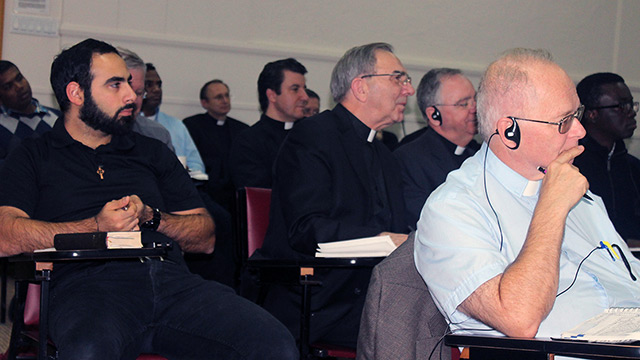Most Priests Essentially ‘Happy’

Montreal
Clergy in general and Roman Catholic priests in particular are among the happiest groups when it comes to personal satisfaction with life and ministry.
What do priests usually do when they gather socially? They complain, of course, says Msgr. Stephen Rossetti, but that doesn't mean they're an unhappy bunch. "It's when the troops stop complaining that you need to worry," says the former U.S. Air Force intelligence officer.
In fact, clergy in general and Roman Catholic priests in particular are among the happiest groups, certainly in the United States. Priests and ministers report the highest level of personal satisfaction with their lives and ministries according to several studies, including a 2009 landmark survey of 2,482 priests conducted by Rossetti.
These results fly in the face of the growing misconception that priests are isolated, burned out and unhappy, observes Rossetti.
The Syracuse diocesan priest and licensed psychologist was here Oct. 26 to present the results of his findings and to lay out a program of psycho-spiritual development for more than 100 Montreal priests and seminarians.
Held at the Grande Séminaire, the clergy-education event focused on the Priesthood Today: Joys and Challenges and attracted a cross-section of the diocesan presbyterate. Organized by the Office for Pastoral Personnel, Archbishop Christian Lépine attended the event, which featured simultaneous translation of the English-language presentation.
Priests' survey
Rossetti, 66, is the former director of the St. Luke Institute, a treatment centre for clergy and religious in Maryland. Having worked for 18 years with those struggling with serious mental-health issues during the height of the Church sexual abuse crisis, he wanted to investigate the overall level of psycho-spiritual health within the priesthood.
A six-page survey - including standard psychological tests, satisfaction scales, spiritual practices, and childhood/developmental experiences - was mailed to more than 4,300 priests in 23 dioceses; 57 percent responded.
The survey revealed that 92 percent of those who responded "report an exceptionally high degree of happiness with being a priest and with their lives."
"We're referring to the inner joy the Lord gives to us," Rossetti explains. "We have good days, bad days, but there remains that internal joy which is a sign of God's presence in us."
Similar studies confirm these findings, Rossetti pointed out during his daylong presentation. A United Kingdom survey of 274 occupations reported that clergy had the highest level of job satisfaction, even though they had one of the lowest incomes. Similarly, a 2006 survey by the U.S. National Opinion Research Center also found that clergy reported the highest level of job satisfaction (87%) and the highest level of overall happiness of any group.
According to Rossetti's survey, the main "happiness" predictors include: a sense of inner peace, a strong relationship to God, a positive view of celibacy, feeling appreciated, and the presence of close friends.
When the "happiness" factor was analyzed to see what variables were associated with priests' sense of fulfillment, the results consistently showed the same elements at work.
Those priests who fell under the happy/fulfilled category also reported having close friends, praying more than one hour a day and going to confession frequently. Conversely, those who had few, if any, close friends, prayed less than 15 minutes a day and went infrequently to confession, usually reported the lowest levels of feeling happy or fulfilled as priests and higher levels of emotional exhaustion and loneliness.
With the survey suggesting that a strong spiritual life is at work in those who scored high in the personal happiness and fulfillment scales, Rossetti used these variables to formulate a 10-step program of holiness. These steps include: cease any serious sin, go frequently to confession (a good confessor is a good penitent), pray more, develop a deeper Eucharistic spirituality and nourish good friendships.
"My overall mission is to help priests live happy, holy lives," he said. "We [priests] have our share of mental health issues, too," he notes, but according to the survey "not any more than what we find in the general population."
'Happy' But overloaded
Montreal priests responded positively to Rossetti's presentation, and many concurred with the two proposals made by their fellow priests. They asked Rossetti: (1) to add an 11th step to the path to holiness - having a competent spiritual director, and (2) to recognize that the increased workloads now required of priests is a pressing challenge that must be addressed.
"It's a huge issue," admitted Rossetti. "We're asking our priests to do more but we're not changing fast enough in our structures," he noted.
In a follow-up interview, Fr. Francesco Giordano agreed that the overwhelming workload is cause for concern. "If not handled properly, it can be harmful," noted the vice-chancellor.
Ordained in 2008, Giordano called the presentation "encouraging." Everything the 45-year-old heard "was a reaffirmation of principles presented to us in our formation and seminary training." As a former mechanical engineer, however, Giordano "looks for what works and doesn't work." As such, he especially appreciated the statistical confirmation that Rossetti's survey provides regarding those seminary-taught principles.
Giordano did remark both that the 90-percent happiness rating seemed high and that the term "happiness" tends to be subjective. "I'd say that most of the priests whom I know are content," the vice-chancellor underscored. "It doesn't mean we're immune from all problems and challenges of life, but our formation gives us the foundation to meet those challenges."
"The more distant you become from Christ, the less happy you are; the more you identify with Christ, the more fulfilled you feel," he concluded, echoing Rossetti's basic findings.

Comment
0 Comment
Add new comment